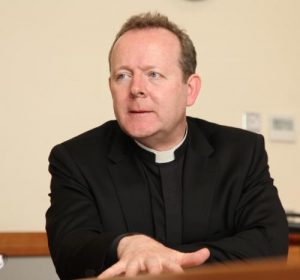
By Sean Ryan - 10 April, 2017

The Archbishop of Armagh and Primate of All Ireland Dr Eamon Martin has said that Northern Ireland needs a “mechanism of truth and information retrieval” to help families get justice and has offered the services of the Catholic Church to help mediate on the issue.
Archbishop Martin made his comments while speaking at the Mass for the Disappeared at St Patrick’s in Armagh yesterday morning.
Sixteen people were abducted, murdered and secretly buried during the Troubles, four of whom are still missing. Despite searches led by the Independent Commission for the Location of Victims’ Remains, people such as Joseph Lynskey, Captain Robert Nairac, Seamus Ruddy and Columba McVeigh remain missing. Yesterday Eamon Martin urged anyone with information to come forward.
Archbishop Martin also offered the services of Church personnel in order to help families. He said that “There must be so many people walking around today who know in their hearts that the information that they have locked down inside them is capable of unlocking the uncertainty and grief of families. For our part, we need to find a mechanism of truth and information retrieval which will allow more of these people to come forward so that many more families can be set free from the agony of waiting and wondering, ‘why?’”.
Offering the services of the Church, he said that “Even in the absence of a formal mechanism, I am confident that there are trustworthy people in society and in the Churches who would be willing, and could be empowered and enabled, to accept and sensitively share information in this regard.”
Archbishop Martin said: “People have become more conscious recently of the urgency of developing appropriate mechanisms for truth-telling about the past, and the sharing of information that will ease the endless questioning, and calm the restless yearning for clarity that still imprisons so many families here”.
He added: “Those who were involved and who hold vital clues and information are getting older and some are dying. Memories are fading. The will to engage is perhaps waning. Family members of victims are themselves getting older. Some have already gone to their rest; others have grown frail and are no longer able to join us here. But the unanswered questions do not disappear with death”.
Commenting on the effects the disappeared have had on families, he said “They linger on, as a constant nagging reminder to the next generation of unfinished business, of a grief that is unsatisfied with silence, a pain that does not go away but lies beneath, an unhealed wound that is passed on from children to grandchildren.”
Addressing the families of the disappeared directly, he said “My dear families of the Disappeared, your experience and painful vigil has many lessons for the wider healing and reconciliation of our troubled past. You, more than any, appreciate how precious it is when someone comes forward and shares details of what they knew, or did, way back then.
“The process that was set in place for an Independent Commission to locate the remains of your loved ones created a mechanism to guarantee those who came forward that the information they provided would only be used for the recovery of the bodies of the Disappeared.
“Today I appeal again to the conscience of anyone who can help with the cases of Joe Lynskey, Robert Nairac, Seamus Ruddy and Columba McVeigh to bring even the slightest clues to the Commissioners’ attention so that the agonising wait of the remaining families can be shortened and their loved ones can at last have a Christian burial.”
He added that “There are other families, whose loved ones were never included in the list of the Disappeared, who remain anguished and tormented by uncertainty about what happened. These too must be helped to find answers and peace.”